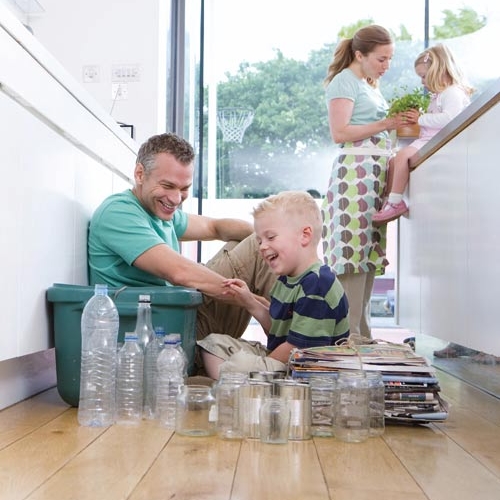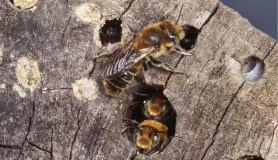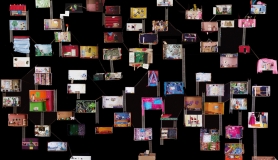When we started we produced 100 litres of rubbish a week: one metal dustbin and two swing bin liners. Last week we put out 25 grams, which I could hold in the palm of my hand. It started with a blog called The Rubbish Diet for inspiration followed by a news article about the devastating effects of plastic on marine life for the final kick in the right direction.
STEEP LEARNING CURVE After deciding to give up carrier bags, we began to recycle more. Then we changed our food shopping habits. If we couldn’t recycle, reuse or compost the packaging we boycotted it. Well, most of the time. This was a steep learning curve, but a liberating one. Yes we were daunted at the prospect of ‘going without’ some of our favourite things. I would like to say we eat natural, seasonal, organic food grown on our land, but we don’t. My daughter likes crisps, my husband likes curry from a plastic tray and I have a serious yogurt addiction.
FOOD ISSUES I cook most meals from scratch, but not all. There is a 21st century girl residing within me who will occasionally feed our daughter and her friends fish fingers, chips and beans. But don’t tell anyone I told you that. I know what I should do. I should make extra meals and freeze portions for those ‘can’t be bothered to cook’ days. What I have in my freezer is five inches of ice and numerous unidentifiable boxes and packets.
CHANGING HABITS All of this is changing however. It takes a long time to change a habit; especially one that is thirty something years old. There is an out of sight out of mind approach to throwing something away. But what I have realised is that there is no such place as ‘away’. When we throw something away, it doesn’t magically disappear to ‘away’ at all. ‘Away’ is a big hole in the ground, an incinerator, the ocean floor or a ship to China. If you remember one thing from this article, then please remember that. So do we have to go without? Not at all! You can find more sustainable choices for virtually anything. Disposable items such as sanitary protection, nappies, biros, breast pads and baby wipes all have reusable options.
HOMEMADE FARE What could be easier than homemade soup and bread, rice pudding made in the slow cooker, or more satisfying than the aroma of home made cakes and biscuits? Whizzing up a batch of humous is often easier than trying to break open the seal on a plastic pot.
ZERO WASTE WEEK In September last year we took the ultimate challenge – zero waste for a week. We succeeded with a couple of near misses and since then have been producing less than 100 grams per week of rubbish, which we are happy with. One thing I learned from my life coach is to take baby steps. If you do, you don’t awaken the ‘flight or fight’ part of the brain. This means you succeed and are motivated to continue.
Here’s how you can reduce your rubbish:
DITCH THE CARRIER BAGS 17½ billion plastic carrier bags are given out annually in the UK; yet only one in 200 is recycled. An estimated one million birds and 100,000 marine mammals die every year from entanglement in, or ingestion of, plastics. Find the carrier bags you have in your house and reuse them or recycle them at a supermarket. Donate them to a charity shop if you have too many. Get yourself a couple of reusable bags. You can make your own with instructions from Morsbags at morsbags.com or buy them. Onya sell a great range or treat yourself to a hand made Carry-A-Bag from Sally who makes all her bags from recycled materials. If you want to save your arms then get a shopping trolley. Trollease produce a range of different colours and styles.
WHAT CAN YOU RECYCLE? Most areas in the UK have kerbside collections and local recycling facilities. These facilities might be at a supermarket, a pub or a local authority household recycling centre. Type your postcode into recyclenow.com to find your nearest facility. Alternatively, call your local council for details. Keep checking for up to date information because services are changing all the time. We find something new every time we visit our civic amenity site.
REUSE A WATER BOTTLE 3 billion plastic bottles of water were sold in the UK last year, of which only 10% were recycled. You can filter tap water easily at home and reuse a bottle to save on plastic. According to We Want Tap, by the year 2050, over half the population will be suffering from severe water shortages. At the moment dirty water kills 1.8 million people a year, ninety percent of whom are children. We Want Tap sell reusable bottles made from non-leaching plastic which are fully recyclable. The company donates 70% of its profits to fund water development projects in the developing world. Kleen Kanteen bottles are made from stainless steel and are available from Little Acorns to Mighty Oaks.
“When we throw something away, it doesn’t magically disappear to ‘away’ at all. ‘Away’ is a big hole in the ground”
DUMP THE JUNK 21 billion items of junk mail are sent out every year in the UK. Paper makes up around a quarter of the contents of the average household dustbin and over 5 million tonnes of paper ends up in the landfill every year. Recycling paper is good, but it can only be recycled five times before the fibres become too weak, so stop what you can at source. Contact the Mail Preference Service on 0845 703 4599 to request an application form for stopping junk mail. Stopping unaddressed mail can be done through calling Royal Mail on 08457 950950 and requesting their ‘door-to-door optout form’ Put a sticker for your letter box saying NO to leaflet drops and you should be junk mail free. You can get the kids to make a sticker or buy them from the Stop Junk Mail website.
CUT THE FOOD WASTE In the UK, we throw away up to one third of the food we buy, which amounts to 6.7 million tonnes. We create food waste by poor portion control, buying too much (BOGOF offers) and not using it in time or impulse buys. Many people think that throwing food in the landfill is ok. However, in the absence of oxygen, food decomposes and produce methane gas, which is a harmful greenhouse gas. Before you go shopping check what you already have. Plan meals around leftovers or anything approaching its use by date. Soft vegetables can be made into soup or pasta sauces. Over ripe fruits can be made into pies or smoothies. Cooked vegetables can be added to bubble and squeak, cooked pasta can be served with vegetables and chickpeas as a pasta salad. When storing leftovers, don’t use cling film. Use a dish covered with a plate or container with a lid. Take the same approach to packing sandwiches. Reuse packaging instead of buying new sandwich bags or buy a laptop lunchbox or stainless steel tiffin. Write a shopping list and stick to it. My best tip to avoid food waste is never to shop when you are hungry!
HANG LOOSE! Many shops sell fruit and vegetables suffocated in plastic wrap. Buy loose produce to get exactly the amount you need. Some supermarkets sell loose fruit and veg, but try your local farm shop or farmers market for seasonal, local, tastier (and often cheaper) produce. Get in the habit of reusing old bags to buy fresh produce – old bread bags, cereal bags or produce bags will do. Keep them in your car or bag so you don’t forget them. But remember that Mother Nature provides: do your bananas, melons, avocados, swede, onions and leeks really need any more packaging than they come with? Alternatively, sign up for a vegetable box scheme. The veg box recipes site has some wonderful ideas for using up excess produce, plus you can find details of your nearest box scheme.
“You can conjure up a little self suficiency regardless of your circumstances.”
GROW YOUR OWN I have a saying which goes along the lines of ‘you don’t need a garden to grow fruit and veg.’ You can conjure up a little self sufficiency regardless of your circumstances. Herbs or sprouted seeds in the kitchen will add flair to your meals. Tomatoes and strawberries will happily tumble from hanging baskets. Salad leaves or mini veg can be grown in window boxes. Peppers will grow in a pot on a large windowsill. Get yourself a compost bin for peelings and you’ll be the proud owner of your own compost. How many of us throw peelings away and go to the garden centre in the spring to buy compost in plastic bags? If you have no garden then a wormery can be kept indoors. A bokashi bin, which sits on the kitchen work surface, will take cooked food scraps including meat, fish and dairy.
GREENER CLEANERS There are products for the sink, bath, toilet, mirrors, tiles, windows, kitchen work surfaces and floors. Not to mention bleach, laundry products, dishwashing products, washing up liquid and air fresheners! Most of these arrive in plastic bottles. Ecover offer a refill service where you can top up washing up liquid, fabric conditioner, multi surface cleaner and laundry liquid at refill stations around the UK. Buying in bulk reduces the amount of waste you create. Buying one 5 litre container of washing up liquid uses about 40% less plastic than buying five 1 litre containers. (It’s true because I’ve weighed the bottles!) Use washable cloths instead of disposables and switch to soapnuts or eco balls. Get yourself a good book on green cleaning and make your own products from vinegar, lemons and bicarbonate of soda.
TOILETRIES Like household cleaners, you’ll find toiletries for every part of your body. Deodorant, shaving foam, shampoo, hairspray, moisturisers and shower gels along with miracle products promising eternal youth can be found in most people’s homes. Minimise the products you use and look for multi purpose ones. I’m currently using Moroccan clay from rawgaia.co.uk to wash my skin and hair. Cleanser can be made from yogurt and oats. Jojoba oil is good for shaving. Almond oil removes make up and coconut oil is a hair conditioner. Baby’s bums can be cleansed with grapeseed oil. Brands which offer returns on empty packaging include Neals Yard and Nothing Nasty. LUSH sell ‘naked’ products and items in recyclable/compostable packaging.
STUFF We live in a culture with an emphasis on mindless consumerism. Don’t buy items with inbuilt obsolescence and adopt some of the ‘make do and mend’ principles that our grandparents were so proud of. Buy secondhand items from eBay or charity shops or buy new items from ethical suppliers which are built to last. Freecycle, freecycle.org , is a great way to get rid of things you no longer need without resorting to landfill and there is a feel good factor when gifting things to strangers. Before buying anything remember to separate your wants from your needs. Don’t buy something to fill an emotional void – maybe you would be better off talking to a friend, working on your self esteem or getting a massage rather than buying the latest gadget or another item of clothing.
USEFUL RESOURCES
myzerowaste.com – follow our progress and get more tips on how to reduce your rubbish .







